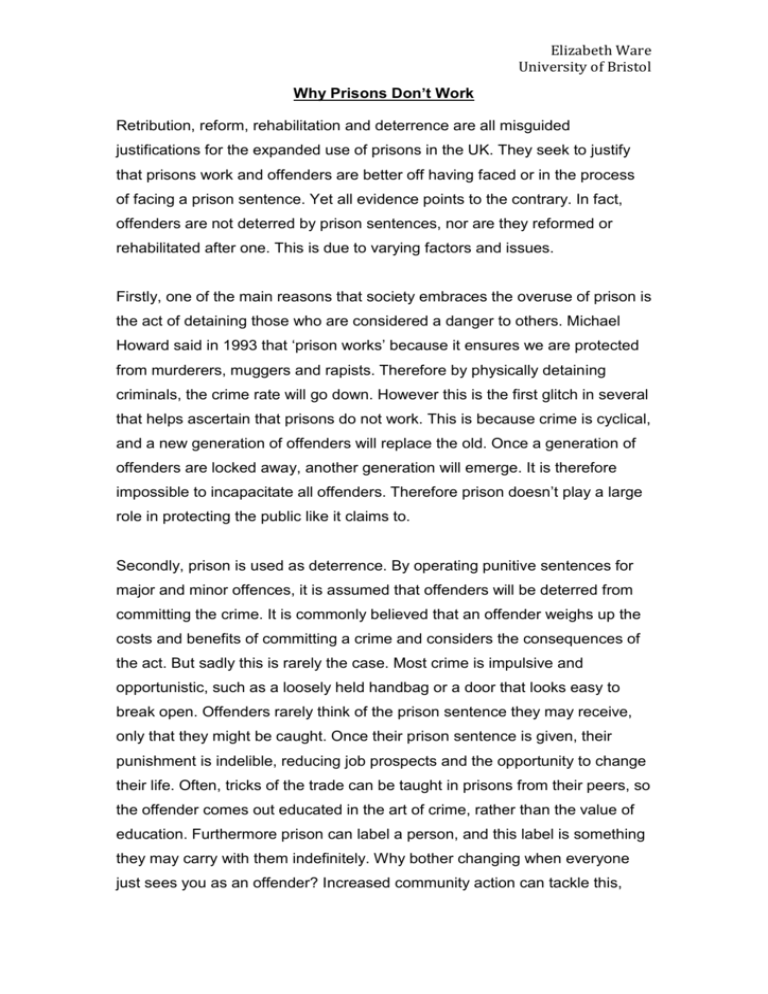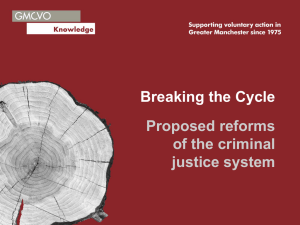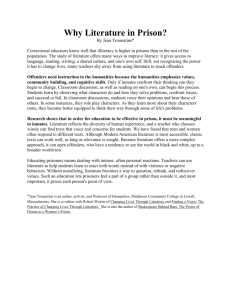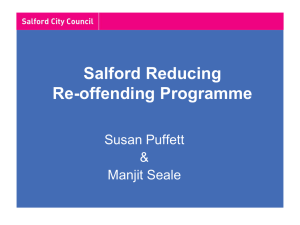Why Prisons Don't Work - The Howard League for Penal Reform
advertisement

Elizabeth Ware University of Bristol Why Prisons Don’t Work Retribution, reform, rehabilitation and deterrence are all misguided justifications for the expanded use of prisons in the UK. They seek to justify that prisons work and offenders are better off having faced or in the process of facing a prison sentence. Yet all evidence points to the contrary. In fact, offenders are not deterred by prison sentences, nor are they reformed or rehabilitated after one. This is due to varying factors and issues. Firstly, one of the main reasons that society embraces the overuse of prison is the act of detaining those who are considered a danger to others. Michael Howard said in 1993 that ‘prison works’ because it ensures we are protected from murderers, muggers and rapists. Therefore by physically detaining criminals, the crime rate will go down. However this is the first glitch in several that helps ascertain that prisons do not work. This is because crime is cyclical, and a new generation of offenders will replace the old. Once a generation of offenders are locked away, another generation will emerge. It is therefore impossible to incapacitate all offenders. Therefore prison doesn’t play a large role in protecting the public like it claims to. Secondly, prison is used as deterrence. By operating punitive sentences for major and minor offences, it is assumed that offenders will be deterred from committing the crime. It is commonly believed that an offender weighs up the costs and benefits of committing a crime and considers the consequences of the act. But sadly this is rarely the case. Most crime is impulsive and opportunistic, such as a loosely held handbag or a door that looks easy to break open. Offenders rarely think of the prison sentence they may receive, only that they might be caught. Once their prison sentence is given, their punishment is indelible, reducing job prospects and the opportunity to change their life. Often, tricks of the trade can be taught in prisons from their peers, so the offender comes out educated in the art of crime, rather than the value of education. Furthermore prison can label a person, and this label is something they may carry with them indefinitely. Why bother changing when everyone just sees you as an offender? Increased community action can tackle this, Elizabeth Ware University of Bristol where offenders take responsibility for their crime and learn the effects they have on society and individuals. In the process, they can pick up invaluable social and interactive skills that support their reintegration in society. This cannot be achieved in prison because people act differently in prison to how they would in the outside world. How can they be expected to change for the better and be rehabilitated when they are in an environment that is purely debilitating? Government justifies the overuse of prison because it believes that offenders can be reformed and rehabilitated, and leave prison a better person, having reflected on their crime. However, this is too often not the case and figures prove this. 66% of those released from prison reoffend within two years. Of more concern, 80% of young offenders released from prison reoffend in two years. It is important to notes that these figures only account for those who are caught. Therefore what is the point of a prison sentence, if it fails to address the very nature of its purpose? It all seems to point towards an expensive waste of time. In the past decade and further back, government has been sucked into a world of punitive populism, delivering harsh sentences to satisfy the public and those directly and indirectly affected by criminal activity. Retribution is the term for such action. It is the idea that wrong doers should be punished for their wrong doings. They should ‘have a taste of their own medicine,’ in the name of fairness. Why should a law- abiding citizen suffer while an offender gets away ‘scot-free’? Equality seems to be the key to social order, so it is assumed that those who commit crime should be punished, in order to even the score. However, what is often ignored is that some offenders already start off life in an unequal position to the law-abiding citizens. Some live in poverty, in disadvantaged neighbourhoods with poor schools and a lack of opportunity. Some live in abusive relationships and families that already offend, making it the norm. Therefore punishing an offender who already started in an unequal position in society will not cause equality. It will cause the opposite and seek to widen the equality gap further. This is particularly affective for young offenders. There is a reason they have turned to crime, surely these should be addressed before their life chances are destroyed further? Elizabeth Ware University of Bristol Prisons should not be abolished, they are integral part of the criminal justice system, and they do serve a purpose in protecting the public. However in terms of justifying prison sentences given to those who commit minor offences, prison does not work. Crime is a social construct, and there are reasons why certain members of the pubic turn to crime while others do not. This is not to say that offenders should not be held accountable for their actions and the effect they have. It means that there are more constructive ways to dealing with those trapped in a cycle of crime. Locking away a persistent shoplifter does not deter them from doing it again, nor does it make then a reformed person when they leave. Instead it creates a bubble where crime is the only thing they know, and the only thing they have been around. There are better ways to hold offenders responsible for their crimes, that benefit the community, the victims and society as a whole, as well as the offender themselves. This means more community sentences.









